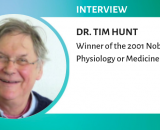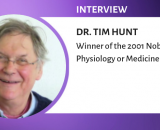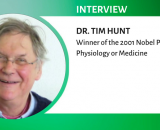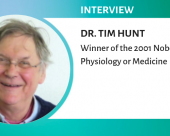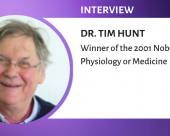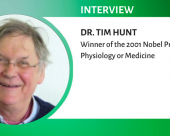Nobel Laureate Tim Hunt on what it's like to win a Nobel Prize
Interview with Dr. Tim Hunt
It is not every day that you get to chat with a Nobel Laureate, so when you do, it’s bound to be special! Catch this interesting interview series with Dr. Tim Hunt conducted by Clarinda Cerejo, Editor-in-Chief, Editage Insights. Through cheerful anecdotes, a characteristically witty humor, and friendly advice, Dr. Hunt narrates his experiences around winning the Nobel Prize and describes how the event changed his life. He also provides some valuable advice for aspiring researchers by sharing some of his experiences as a scientist.

It is not every day that you get to chat with a Nobel Laureate, so when you do, it’s bound to be special! When I was introduced to Dr. Tim Hunt and began corresponding with him for this interview, I was a tad nervous and appropriately formal and elaborate in my exchanges. But Dr. Hunt quickly disarmed me with cheerful anecdotes, witty remarks, and even friendly banter. The interview offered some gems by way of his experiences with winning the Nobel Prize and his advice for aspiring researchers. I hope you enjoy reading this interview series as much as I enjoyed putting it together.
Dr. Tim Hunt is renowned for his work on cell cycle regulation for which he won the 2001 Nobel Prize in Physiology or Medicine along with Dr. Lee Hartwell and Dr. Paul Nurse. Dr. Hunt discovered cyclins, proteins that are crucial for mitosis and other cell cycle transitions. Before this, the focus of Dr. Hunt’s research was on the control of haemoglobin synthesis in red blood cells. After a long and successful academic career that culminated with him as a principal scientist at the Imperial Cancer Research Fund (now Cancer Research UK), Dr. Hunt is currently retired.
Dr. Hunt, let's start with your experience winning the Nobel Prize. The Prize is the best-kept secret of the year, where even the nominees do not know that they are being considered for the prize. When and how did you learn about winning the Prize? And what were your initial reactions?
I was terribly surprised, actually! It was a rainy Monday morning, around 10:00. I was in my office going over one of my postdoc’s latest results, and he had just gone down to get a cup of coffee. The phone rang and a man with a Swedish accent said, “I am Hans Jörnvall, Secretary of the Nobel Committee.” I don’t fully recollect what he said after that. Maybe he said, “I have some very good news for you. You have won the Nobel Prize.” I said, “Oh yes?” He said, “Yes, together with Lee Hartwell and Paul Nurse.” That was no surprise because the work of Lee Hartwell and Paul Nurse was certainly prize-worthy.
But I didn’t expect it and I didn’t really believe it. And then he added, “By the way, you mustn’t tell anybody about this for the next 20 minutes, because it’s embargoed until then.” By this time, it was 10 minutes past 10:00. He added, “Oh, and by the way, do you happen to have Lee Hartwell’s home phone number because we can’t find it anywhere.” I said, “No, I don’t, but you could look him up in the National Academy Directory.” I don’t know how they found his number eventually.
After I had put the phone down, the postdoc returned with his coffee. Although I was agitated, I couldn’t tell him anything; it wasn’t half past 10 yet! I tried to call Paul Nurse, my boss at the time, and spoke to his secretary because Paul was out at a meeting. It was clear that she had no inkling of what was about to happen. I simply left a message for Paul to return my call. At about half past 10, Paul called me and I said, “Paul, do you think this is real?” He said, “Well Tim, I think so because a similar message was left on my voicemail while I was in the meeting, and I ignored it. Why don’t you look it up on the Internet?” So I Googled “Nobel” to look for our names and found that indeed, by now, it said “Hartwell, Hunt and Nurse.”
Well, the news sinks in slowly and you feel uncomfortable because you worry that other people might think that you are not really worthy of it: that’s what I thought. Interestingly, about a couple of weeks after the announcement, I ran into Paul and he said, “Oh Tim, I’ve just had most ghastly weekend because I felt so unworthy.” I was not alone, then! Winning a Nobel certainly leads to a lot of soul searching and you end up thinking, “Why me?” You reflect back upon your career. If you read the autobiographies of previous Laureates, you will see that this reaction is common.
Could you share your experience at the award ceremony?
The award ceremony comes as a bit of surprise, too! The whole affair lasts a week; there are many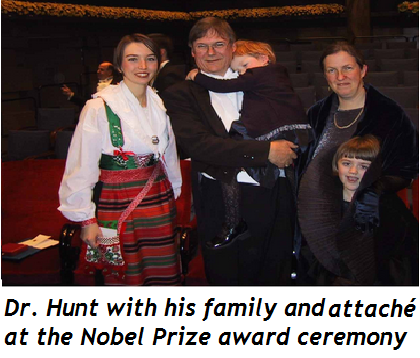 parties, engagements, interviews and events. You are assigned an attaché, someone who will be your guide and help you throughout during the award ceremony. My attaché, a very young Swedish girl, was in fact one of the youngest people in the Swedish Ministry of Foreign Affairs. She always carried a dossier for me, which was roughly 6 inches thick, with details of everything I might need. During the whole week, Laureates are treated like royalty and it’s an incredible experience. We also had practice sessions to help us prepare for the ceremony. They teach you how to shake hands with the King with one hand and receive your certificate with the other. The actual ceremony is very grand, with trumpets and everything!
parties, engagements, interviews and events. You are assigned an attaché, someone who will be your guide and help you throughout during the award ceremony. My attaché, a very young Swedish girl, was in fact one of the youngest people in the Swedish Ministry of Foreign Affairs. She always carried a dossier for me, which was roughly 6 inches thick, with details of everything I might need. During the whole week, Laureates are treated like royalty and it’s an incredible experience. We also had practice sessions to help us prepare for the ceremony. They teach you how to shake hands with the King with one hand and receive your certificate with the other. The actual ceremony is very grand, with trumpets and everything!
Here’s an interesting anecdote. While waiting for my flight to Stockholm, I went to ask for the lounge at Heathrow airport. The woman behind the desk looked at my ticket and said, “I am sorry, sir, the lounge is full.” I said, “How can the lounge be full at 9 o’clock in the morning!” When she continued being unhelpful, I drew myself up to my full height and told her that the ticket was sponsored by the Nobel Foundation. This seemed to have had the desired effect. She made a phone call, perhaps to validate my claim, and suddenly, the lounge was no longer full and she was very obliging! When I arrived in Stockholm, Hans Jörnvall and my attaché were waiting for me and I was given the VIP treatment. The funny thing was, as soon as we returned to Heathrow, the royal treatment was over! We had to wait for the bus to the long-term car park.
I confess that until I actually received the medal itself, held it in my hand, I half expected the Nobel Committee to realize that they had made an unfortunate mistake, and feared the King would say, “Sorry, the award is not for you; it’s actually for the other Tim Hunt!” I was lucky to share the prize with two very highly accomplished colleagues who were much more experienced than I was. I could sit in the background while they gave votes of thanks. The other good thing was that the same year marked the 100th anniversary of the Nobel Prize and all living Laureates were invited to the ceremony. This also drew some of the attention away from us, and helped calm our nerves. But still, receiving the Nobel Prize is a big deal and I still felt rather unworthy and not at all Nobel Laureate-ish. As time passes, you do get used to it because people treat you with a lot of respect.
How did winning the Nobel Prize change your life? Did it affect the time you spent with your family?
That’s an interesting question! Initially, we had many parties to attend as well as invitations to various places. Many people wanted to share the joy and that was nice. Then, gradually, you begin to take on the life of a Laureate. For example, I was quite surprised when British Airways sent me a gold card, because I had covered a lot of business class miles. Suddenly you find yourself occupying seats at the front of the plane rather than at the back and staying in the nicer hotels with bigger rooms. People do continue to pay attention to you, ask you for autographs or to pose for a selfie with them. Initially it can be quite overwhelming but eventually you get used to it.
Life was pretty hectic after winning the Prize. On a few occasions, I did get lucky and was able to spend quality time with my family. For instance, with the help of a Japanese friend, I got a fellowship in Japan, which enabled my whole family to attend a meeting in Japan. That trip to Japan was memorable. Later, we all went to Bilbao where I was invited to give a lecture. This doesn’t happen too often now. Presently, I’m retired but my wife is still working and our daughters go to school, so my family doesn’t get to travel with me very often, which is a shame and not very fair.
Read the next two segments of our interview with Dr. Tim Hunt:
Published on: Sep 25, 2015
Comments
You're looking to give wings to your academic career and publication journey. We like that!
Why don't we give you complete access! Create a free account and get unlimited access to all resources & a vibrant researcher community.




